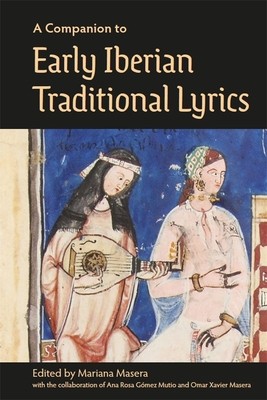
- We will send in 10–14 business days.
- Publisher: Tamesis Books
- ISBN-10: 1855663899
- ISBN-13: 9781855663893
- Format: 15.6 x 23.4 x 1.8 cm, kieti viršeliai
- Language: English
- SAVE -10% with code: EXTRA
A Companion to Early Iberian Traditional Lyrics (e-book) (used book) | bookbook.eu
Reviews
Description
Accessible and reliable introduction in English to the earliest vernacular lyric poetry in the Iberian Peninsula.
Dating to the tenth century, the earliest vernacular lyric poems in the Iberian Peninsula have been seen as evidence of an even older, oral, folk tradition and attest to the multicultural, multilingual nature of the genre from its very beginning. Primarily preserved in manuscript and printed songbooks, these poems were widely diffused across the Hispanic world. This Companion offers an accessible, reliable introduction in English to early Iberian traditional lyrics from a comparative and interdisciplinary perspective, paying special attention to their multicultural origins and their complex nature as both oral and written compositions. The opening chapters discuss the importance of understanding this dual essence in studying traditional lyrics today, provide an outline of their structure and formal features, and offer a contemporary overview of the field. The volume then examines the kharjas, the cantigas de amigo, and the tradition of Catalan lyricism before turning to a comparison of popular lyrics with the poetry of the cancioneros and romanceros and the preservation of the tradition in Sephardic ballads. The final chapters examine the survival of popular lyrics into the modern era and explore a new means of interpreting these poems through musical archaeology and musicological studies.EXTRA 10 % discount with code: EXTRA
The promotion ends in 23d.22:03:00
The discount code is valid when purchasing from 10 €. Discounts do not stack.
- Publisher: Tamesis Books
- ISBN-10: 1855663899
- ISBN-13: 9781855663893
- Format: 15.6 x 23.4 x 1.8 cm, kieti viršeliai
- Language: English English
Accessible and reliable introduction in English to the earliest vernacular lyric poetry in the Iberian Peninsula.
Dating to the tenth century, the earliest vernacular lyric poems in the Iberian Peninsula have been seen as evidence of an even older, oral, folk tradition and attest to the multicultural, multilingual nature of the genre from its very beginning. Primarily preserved in manuscript and printed songbooks, these poems were widely diffused across the Hispanic world. This Companion offers an accessible, reliable introduction in English to early Iberian traditional lyrics from a comparative and interdisciplinary perspective, paying special attention to their multicultural origins and their complex nature as both oral and written compositions. The opening chapters discuss the importance of understanding this dual essence in studying traditional lyrics today, provide an outline of their structure and formal features, and offer a contemporary overview of the field. The volume then examines the kharjas, the cantigas de amigo, and the tradition of Catalan lyricism before turning to a comparison of popular lyrics with the poetry of the cancioneros and romanceros and the preservation of the tradition in Sephardic ballads. The final chapters examine the survival of popular lyrics into the modern era and explore a new means of interpreting these poems through musical archaeology and musicological studies.

Reviews